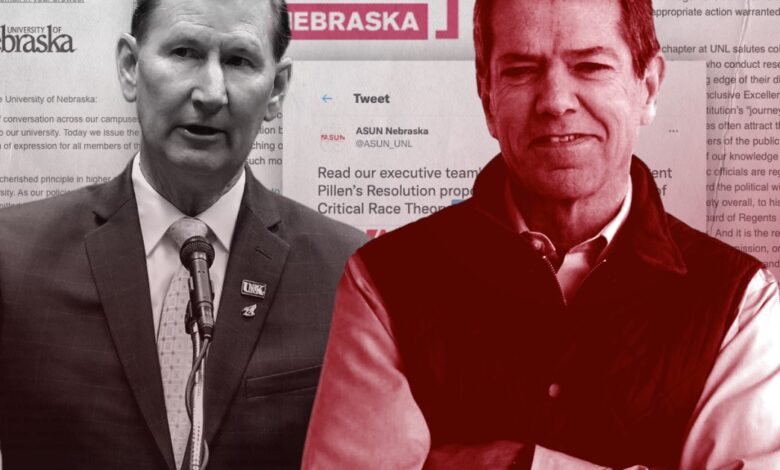Nebraska Regents to Vote Friday on Whether to Join Condemnations of Critical Race Theory

[ad_1]
The University of Nebraska’s Board of Regents will vote on Friday whether to take a stand against critical race theory’s being “imposed” in curriculum, training, and programming.
Jim Pillen, the regent who introduced the resolution, recently announced that he’s running as a Republican for governor of Nebraska. Supporters of similar measures have characterized critical race theory as discriminatory and anti-American — a depiction scholars of the theory firmly reject. Critics view his proposal as an attempt to score political points with voters. And they say an affirmative vote would violate the spirit of the board’s bylaws, which refer to the principles undergirding academic freedom as “the fiber of America’s greatness,” and say its preservation “is vital.”
It’s the latest fight related to critical race theory to consume higher ed this summer, and it has animated students, faculty members, and administrators on the system’s campuses in Kearney, Lincoln, and Omaha, and at its Medical Center.
‘Their Own Political Gain’
Critical race theory is an academic framework that began taking shape among legal scholars in the 1970s and 1980s as a way to examine the relationship between race and American law. Among its core tenets are that racism is not solely perpetrated by individuals but by systems, that race is a social construct, and that racial progress is not a given. Last year, after President Donald J. Trump described it as a “Marxist doctrine holding that America is a wicked and racist nation,” opposition to the theory, often called CRT, gained traction among conservative pundits, media, and think tanks. Republican state lawmakers introduced bills in more than 20 states to curb what they saw as the outsize and dangerous influence of the theory at schools, colleges, and other public institutions, The Chronicle previously reported.
Scholars of race and racism have said Trump’s and others’ depiction of critical race theory is erroneous and inflammatory. “I think some people really don’t know” what it is, said Jeannette Eileen Jones, an associate professor of history and ethnic studies on the Lincoln campus. “But I think the more savvy individuals are deliberately miscasting what it is for their own political gain.”
Enter the gubernatorial race. Pillen, who was elected to the Board of Regents in 2012, declared in April that he would run for governor. A former defensive back for the Huskers, Pillen earned a doctoral degree in veterinary medicine at Kansas State University and later started a pork-production company.
In a campaign video, Pillen said that as governor he’d “stand up to radicals who want to use red tape and fake meat to put Nebraska out of business,” and also “keep the socialist agenda out of our state.”
On June 8, Charles W. Herbster, another Republican candidate for governor, put out a statement about critical race theory that said the “radical liberal agenda” was “pushing for the incorporation of this theory in our classrooms.” He called on the Board of Regents, including Pillen, to “denounce critical race theory in our university system.” Later that month, two local groups, the Nebraska Freedom Coalition and the Nebraska Federation of Republican Women, called on Pillen to do the same.
At a Board of Regents meeting a few days later, no one mentioned critical race theory, the Lincoln Journal Star reported. But afterward, Pillen, who said he was speaking as a candidate for office, criticized the teaching of the theory. He reportedly said, “I oppose CRT today, I oppose it tomorrow, and I will oppose it as your governor.”
At some point, Pillen called at least a few fellow regents, including Barbara Weitz. He told her he was thinking about critical race theory and seemed to want to take her temperature on the matter, Weitz said. But he wasn’t “real clear” about what he thought the theory “was about,” she said.
So she was surprised when she learned that he’d submitted a resolution to the full board that, if approved, would oppose the imposition of critical race theory in curricula. Pillen has said that the measure would not ban the teaching of the theory but is intended to ensure that no student is required to learn about it in order to graduate, the Omaha World-Herald reported. Pete Ricketts, the current governor, a Republican, tweeted out a version of the resolution on July 8, and thanked Pillen for “leading the fight against this divisive and anti-American philosophy!”
The resolution before the full board says that critical race theory “seeks to silence opposing views and disparage important American ideals” and that it “does not promote inclusive and honest dialogue and education on campus.” It also posits that America “is the best country in the world and anyone can achieve the American Dream here.”
“It’s very sad for me to see this happen,” said Weitz, who worked for years as a full-time instructor at the Omaha campus’s School of Social Work. Pillen “is a great regent,” she said. “Obviously there are some things we disagree on, but we can talk about them, you know. But this kind of hit me out of the blue.”
“The state of Nebraska,” she said, “deserves better.”
‘Fiber of America’s Greatness’
Many in the university system agree. That Pillen introduced the measure in the name of maintaining an “inclusive and honest dialogue” on campus is “craven political sophistry,” said the Lincoln campus’s chapter of the American Association of University Professors. (Pillen did not respond to The Chronicle’s interview requests.)
It’s “disappointing” that Pillen has “chosen to bring his political aspirations into his position and have them override his work for the university,” said Julia Schleck, an associate professor of English and past president of the AAUP chapter. And, said Schleck, “it’s unusual to have a regent do this, since it’s a betrayal of the trust that one places in regents to at least uphold their own bylaws.” Those bylaws say that the “right to search for truth, to support a position the searcher believes is the truth, and to disagree with others whose intellect reaches a different conclusion” is the “fiber of America’s greatness.”
“It is, likewise, the strength of a great university, and its preservation is vital,” the bylaws say.
A teacher or researcher is ensured “freedom in research and publication of the results of research, limited only by the precepts of scholarship and faithful performance of academic obligations,” the bylaws say. Professional-staff members “are entitled to freedom in the classroom in discussing their subjects.” The regents’ policies state that the university is “clear in its commitment and faithful to the preservation of academic freedom.”
The AAUP’s national office has also voiced concern. The organization added the University of Nebraska at Lincoln to its censure list in 2018. After a lecturer protested a Turning Point USA recruitment table on campus, an AAUP investigation concluded that she had been suspended and not reinstated probably because of the political content of her speech.
In the years since that incident, the AAUP staff had been working with administrators and faculty members to remove the censure, and they’d made a lot of progress. But that process — because of Pillen’s resolution — is now on pause, an AAUP staffer told Chancellor Ronnie D. Green in a letter that The Daily Nebraskan reported. “An institution whose governing board dictates the subjects that its faculty members may or may not address in their classrooms fails to honor the basic tenets of academic freedom,” the staffer wrote.
Students, too, have pushed back against Pillen’s proposal. The system’s four student governments oppose the resolution, as do some Nebraska athletes. “It really is just very reflective of the culture that has been set in the United States as far as wanting to shy away from difficult conversations,” Sadio Fenner, a track-and-field athlete, told the Omaha World-Herald.
University leaders are also against it. Regents do not normally involve themselves in the curriculum, Ted Carter, the system’s president, told The Chronicle, but rather, “we empower our academic deans, our academic chairs, to manage curriculum.”
“I have a pretty good eye for what world-class faculty look like. And we have them here in Nebraska. I trust them to be able to do the right thing,” Carter said, adding that there is already a process through which students can raise concerns if they feel as if any sort of academic theory is being pushed on them unnecessarily. In 2018 the regents mandated that each campus report annually any complaints that students or faculty members were unable to express their views freely. Since the policy was adopted, Carter said, the university has received zero complaints.
He also said that there’s “a certain level of distrust that this resolution brings forward, that we are somehow imposing critical race theory on our students, which is not true. There is nothing in our curriculum that lists critical race theory as a requirement to graduate either at the undergraduate level or the graduate level.”
“We want to make sure that we are not shutting down any voices on any side of any issues,” Carter added. “Our students are not children. They’re adults. They have the capability to discern and make decisions for themselves.”
‘Outside the Scope of the Board’
Five of the eight elected regents need to approve the resolution for it to pass. One regent, Elizabeth O’Connor, said she’s “fairly sure” that it won’t get that much support. “I think that this is outside the scope of the Board of Regents. We don’t set curriculum.”
Still, prominent conservatives in the state are insisting otherwise. A Tuesday letter, signed by Governor Ricketts and other state leaders and lawmakers, says that tax dollars are “being used to push CRT at the University of Nebraska right now.” They also criticized Green, the chancellor, for announcing last summer that he’d make “antiracism” and “equity” top priorities, saying that similar initiatives at other institutions have “required students to take courses tainted by CRT and subjected them to racially discriminatory trainings.” (Green had called for the institution to begin “a journey of addressing antiracism and racial equity,” in part by developing a clearer process for addressing climate issues on campus.)
To Jones, the associate professor of history and ethnic studies, all the opposition to critical race theory is a backlash to the reckoning that surged in 2020, in the wake of the killings of George Floyd, Breonna Taylor, and Ahmaud Arbery. The wave of activism inspired by those deaths is now spurring some people to try to shut down any conversation about race, Jones said. Which means this fight is about more than what is allowed to be discussed in classrooms.
“It’s about academic freedom, but it’s also about truth telling,” she said. As a country, “we have to have real, critical, transparent conversations about the history of racism and white supremacy in our nation, and its legacy, and its manifestations today.”
If we can’t do that, she said, we can’t move forward.
[ad_2]
Source link






